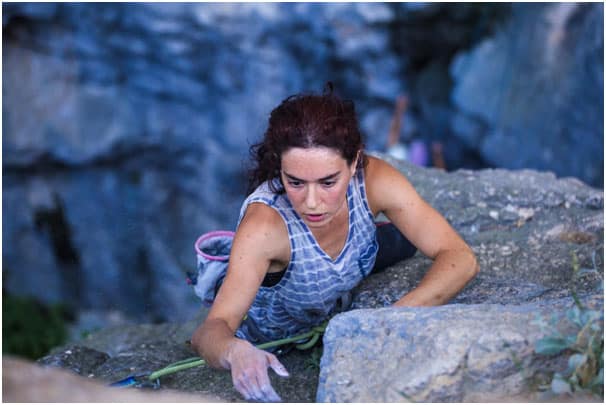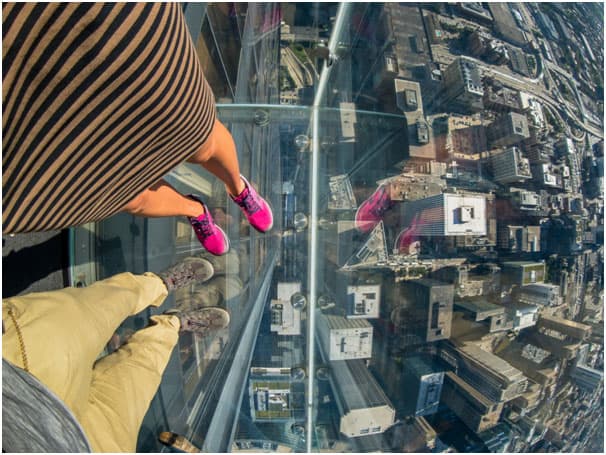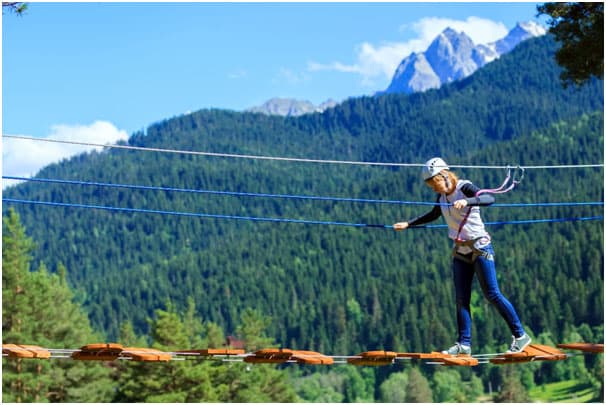Do you have a fear of heights? Do you find your eyes closed when crossing a bridge or on scenic drives in the mountains? Is needing to climb a ladder enough to cause you to break out in a cold sweat? Does the thought of having to go up onto the high floors of a building cause heart palpations? If you answered yes, then you may have acrophobia.
Acrophobia is the fear of heights. It is a relatively common phobia that causes panic and anxiety when faced with having to deal with heights. It can be more severe for some. Some people can fear heights when faced with a stepladder and others when travelling on an airplane or in the upper floors of a skyscraper or crossing a bridge. Just seeing photos of these things can provoke a reaction so you may avoid heights altogether. This can cause distress in your daily life.
Acrophobia Symptoms
Acrophobia is different to vertigo. Vertigo is when you get an unpleasant sensation of spinning. It is really a symptom of acrophobia. But the main symptoms are panic and intense anxiety. Physical symptoms can include:
- Needing to crawl on your hands and knees to descend a mountain or from other places that are high up because looking down is terrifying or paralysing.
- Light-headedness or nausea when thinking of having to deal with heights.
- Feeling like you will fall or dizziness when you look down or up at high places.
- Trembling or shaking when you have to deal with heights.
- Chest pain, heart palpitations or increased sweating at just the thought or sight of high places.
- You burst into tears or start yelling, have trouble breathing or have a panic attack.
Psychological symptoms of acrophobia include:
- An extreme fear of becoming trapped in a situation high above from the ground.
- Excessive worry about encountering situations that involve heights.
- Panicking when you think about or encounter having to go into situations that involve heights.
- Extreme anxiety when faced with climbing a ladder, crossing a bridge, looking out the window of a skyscraper, even just standing on a chair, for example.
What Causes Acrophobia
Acrophobia can come from a natural fear of falling and getting hurt. Concentrating on the likelihood of getting injured can make it more likely to develop a fear of heights. A healthy fear of heights is normal as it keeps you safe. But when it is out of proportion to the situation, it can negatively affect your life. Sometimes it is a learned behaviour in response to:
- Seeing someone fall from a high place.
- Falling off something that is high.
- A negative experience or panic attack when in a high place.
But acrophobia may develop for no known reason. Environmental factors and genetics can also play a role in developing acrophobia. If someone in your family is scared of heights, it may be more likely that you will too.
Diagnosing Acrophobia
A mental health professional can diagnose acrophobia. Talk to your doctor about your fear and they can give you a referral.
When diagnosing a fear of heights, there will be a series of questions to answer. Questions such as, “What happens when you have to face heights?” Make sure you talk about what happens to you both physically and mentally as well as how long a fear of heights has been a part of your life.
You may receive a diagnosis of acrophobia when you:
- Go out of your way to avoid heights.
- Become fearful and anxious as soon as you face situations that involve heights.
- Worry all the time about having to deal with heights.
- Worry about heights and it starts to affect your life daily.
- Have the symptoms of acrophobia for six months or more.
Techniques for Dealing with Acrophobia
If a fear of heights is negatively impacting your life, the following techniques may help you. It is certainly possible to overcome your fear over time.
What Triggers your Fear of Heights?
Find out what triggers your intense fear of heights. You may need the help of a therapist for this. Depending on how severe you fear is, you may be able to overcome it in some situations.
Have you ever not taken a job because it was on a floor high up in a building? Or turned down meeting with people because of your fear? If your answer is yes, then you need to discover what triggers your fear. It could be something more serious such as an anxiety disorder.
Think about all the times your fear prevented you from doing what you wanted to do. Make a list. This will show how often your fear impacts your life. Once you understand this, seek help to overcome your fear if you need it.
How Likely will what you Fear Harm you?
Acrophobia is an irrational fear of situations that most people do not fear. If your fear of heights is minor, then you can put things into perspective. Usually the things that trigger acrophobia (bridges, airplanes, tall buildings, mountains) are safe. So it is unlikely any harm will come to you if you are brave enough to push through your fear.
Do some research on the statistics of how often people get hurt when they fly or work in a skyscraper. These can show you how unlikely you are to get hurt in these situations.
Try Gradual Exposure to your Fear
Try exposing yourself to what you fear gradually. This can desensitise you to the trigger. Start simply with a two storey building or a low bridge or hill. As you become braver, start walking up the hill to higher ground, for example. Do the same with a multistorey building and keep moving up the floors one by one. Before you know it, you will achieve what you never thought you could.
Celebrate each accomplishment. Be proud of every step forward and keep going. Once you are comfortable, tackle a large hill and look down to see how far you have come. Even take a friend with you for support.
Try Rationalising what you Fear
Usually your fear of heights is irrational. For example, when crossing a bridge in a vehicle high up in a mountain, it is unlikely that any harm will come to you..
Once you develop a fear, it is all too easy to forget how safe certain situations are once you become anxious. The way you feel can feed your irrational thoughts until they are totally out of control. To combat this, make a conscious effort to counter your fear by thinking rationally. Remind yourself the situation is perfectly safe so there is nothing to fear. This can help you overcome your fear of heights in some situations.
Prepare to Face what your Fear
Prepare to face what you fear. Imagine how the situation will make you feel and work out ways to help you relax. This will help you when you know that you have to face your fear of heights. It can stop you from panicking and to stay calm. By planning ahead, you can normalise situations that involve heights. This will make you feel more confident and in control.
Visualise Succeeding
Visualise yourself successfully facing your fear of heights. Close your eyes and visualise how safe the situation is. See the safety rails and imagine yourself holding onto them for support. With these images in your subconscious, they will assist you if you start feeling anxious.
Use Relaxation Techniques
Sweating profusely, difficulty breathing and a rapid heartbeat are all common symptoms of acrophobia. And when they affect you, they can make your feelings of panic and fear worse. Use relaxation techniques to get those feelings under control. Try using yoga, deep breathing techniques and mindful meditation to calm down. Also, choose something to focus on other than what you fear.
While acrophobia is a common phobia, it can really take control of your life. If you are spending too much time worrying about heights or avoiding situations where you need to face them, it is a good idea to get assistance from a good therapist.
Blissiree Pty Ltd
Suffering with acrophobia can make a lot of situations difficult. And it may turn into a nightmare when it is out of control. It can affect all parts of your life and even your relationships.
You may often wish you could just face your fear to conquer it. But if it is out of control, you may need to seek help to break its hold. Until you do something to change the way heights make you feel, it will continue to negatively impact your life.
The Blissiree Pty Ltd is pioneering a new technique. A natural treatment that may help you cope with the symptoms and triggers of acrophobia. It only requires for you to relax. Highly trained facilitators help you learn to recognize the triggers and how to manage them to give you a new perspective. This may help you control your excessive worrying and feelings of fear. And you may notice an improvement after the first session.
If acrophobia affects your daily life, it is time to turn it around. Time to do something positive. Seek help. Take back control. You do not have to go through it alone. The sooner you get help, the sooner you can start taking good care of your mental health. And get back to enjoying life.
Reach Out
If a fear of heights has a daily effect on your life, reach out to our professionals. When you are not coping, contact us. We can talk to you about how to get your life back on track. But if you reach a crisis point, call us immediately. We are here to support you.
We can work with you over the phone, via Skype or in our Spa. Book in today for my special introductory offer of just $49 (private health rebates apply) so you may turn your life around. We aim to help you cope with any mental health challenges and the symptoms of acrophobia that negatively affects your life. Our facilitators may help you to better manage it so you start enjoying life again.
Let me Help you Manage your Acrophobia
My Emotional Empowerment Program has helped many people for more than a decade. My aim is to help you naturally deal with the symptoms of acrophobia better so you may live a more normal life. The aim is to give you a new hope for the future. A future filled with happiness, peace and contentment in weeks not years so you can start living life to the fullest.
Discover a seamless way that may help you manage your emotional and mental health. Become a member where you can access more than 100 audio programs that may help you to live an inspired life.
Check out my latest documentary—Blue Rain – PTSD The Silent Suffering. Follow the lives of four people as I work with them to improve their mental health. It will give you good insight into what it is possible.
What are you waiting for? Try us now. You have nothing to lose.





